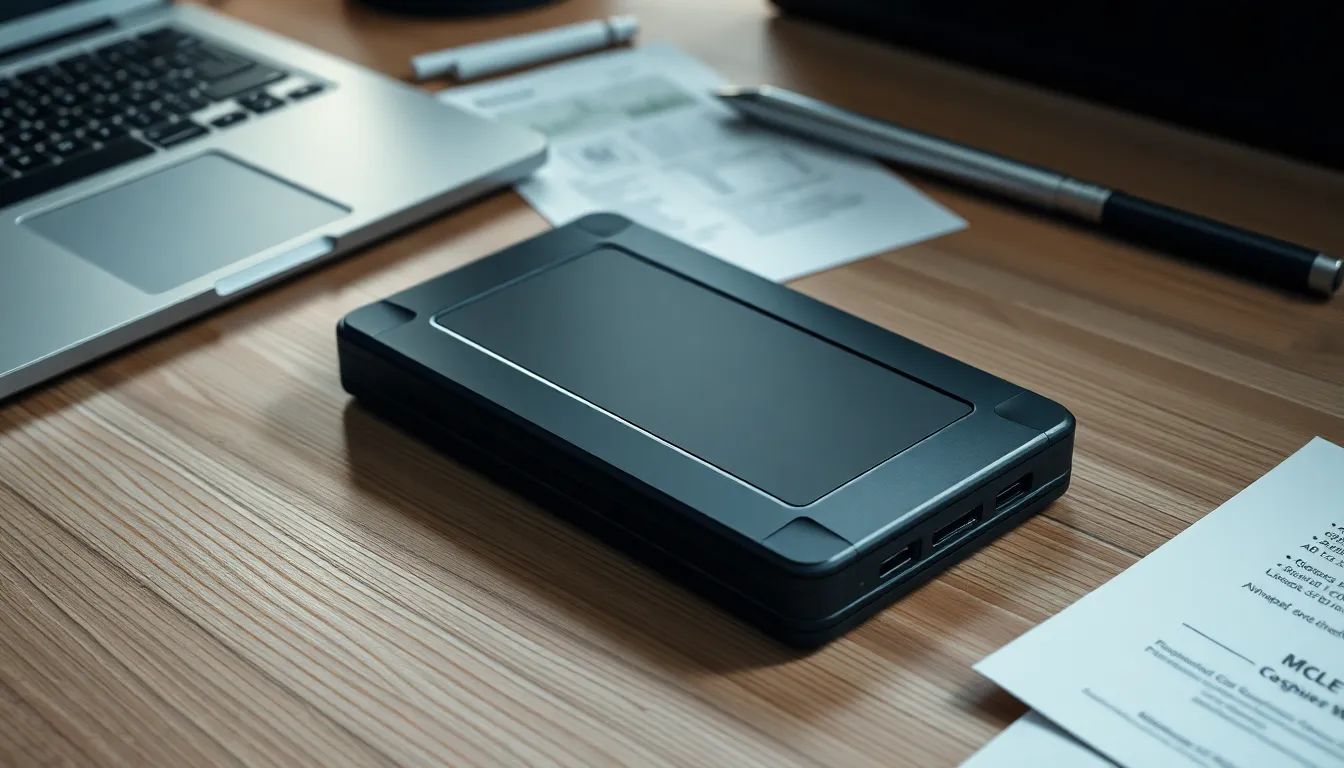In today’s digital age, the need for reliable data storage has never been greater. Whether it’s for backing up important files or transferring large media collections, a portable hard drive offers the perfect solution. With advancements in technology, these devices have become faster, more compact, and more affordable, making them an essential tool for students, professionals, and tech enthusiasts alike.
Choosing the best portable hard drive can be overwhelming with countless options available. Factors like storage capacity, speed, durability, and portability play crucial roles in finding the right fit. This guide dives into the top contenders on the market, helping readers make informed decisions that suit their unique needs. Discover the ideal portable hard drive that not only meets expectations but also enhances productivity and peace of mind.
Table of Contents
ToggleOverview Of Portable Hard Drives
Portable hard drives provide a flexible solution for data storage, allowing users to easily back up files and transfer large amounts of data between devices. They come in various sizes, typically ranging from 500 GB to 10 TB. Each capacity meets different storage needs, ensuring options for casual users and professionals alike.
Portable hard drives utilize USB 3.0 or USB-C connections, maximizing data transfer speeds. USB 3.0 devices often reach speeds of 5 Gbps, while USB-C may offer even quicker transfer capabilities under optimal conditions. This speed is essential for users needing efficient data movement, especially for large files like videos and high-resolution images.
Durability remains crucial for portable hard drives. Many manufacturers design these devices with rugged casings, ensuring protection against drops and environmental factors. Look for models with shock resistance and waterproof features to enhance longevity.
Portability defines the ease of carrying these devices. Most weigh under 2 pounds, allowing users to store them in backpacks or laptop bags. Their compact size and lightweight nature make them practical for on-the-go lifestyles.
Users must also consider power sources. Many portable hard drives draw power directly from the computer via USB connections, eliminating the need for external power supplies. This feature adds convenience, especially for users who work from multiple locations.
Choosing the right portable hard drive simplifies tasks, boosts productivity, and provides necessary peace of mind. Factors like storage capacity, speed, durability, and portability play significant roles. Selecting a device that aligns with specific needs ensures efficient data management in today’s digital landscape.
Features To Consider

Selecting the right portable hard drive involves understanding several key features. These factors determine how well the device meets specific storage needs and usage scenarios.
Storage Capacity
Storage capacity varies significantly, ranging from 500 GB to 10 TB. Users should assess their storage requirements based on the volume of files, including documents, photos, videos, and applications. For heavy media users, opting for a larger capacity is essential to avoid constant data management. Devices typically feature capacities that cater to both casual users and professionals requiring extensive storage.
Data Transfer Speed
Data transfer speed is vital for efficient file management. Most modern portable hard drives utilize USB 3.0 or USB-C connections, which can reach speeds up to 5 Gbps and 10 Gbps, respectively. Faster transfer speeds simplify moving large files, making it crucial for users who work with high-resolution media or sizeable datasets. Buyers should pay attention to read and write speeds when comparing different models.
Build Quality
Build quality directly influences the longevity and reliability of portable hard drives. Many models include rugged designs or shockproof features, protecting the device from drops and impacts. It’s important to consider weather resistance as well; some drives offer protection against dust and water, making them suitable for outdoor use. Durable construction minimizes the risk of data loss, ensuring that files remain safe during transport.
Top Picks For Best Portable Hard Drive
Several portable hard drives stand out in the market, each offering distinct advantages for various user needs. Below are some top picks that combine quality, performance, and reliability.
Brand A: Model X
Brand A’s Model X features a storage capacity of up to 5 TB, ideal for extensive media libraries. It utilizes USB 3.2 technology, achieving transfer speeds up to 10 Gbps. Its lightweight design, weighing just 0.5 pounds, promotes portability. The drive is equipped with a rugged, shock-resistant casing to withstand drops and impacts. Additionally, it includes built-in encryption software for added data security.
Brand B: Model Y
Brand B’s Model Y is designed for users needing a balance between performance and portability. With storage options ranging from 1 TB to 4 TB, it accommodates various file management needs. This model supports both USB-C and USB 3.0 connections, ensuring compatibility with multiple devices. The transfer speed reaches 5 Gbps, suitable for standard media files. Its aluminum casing enhances durability, protecting against physical damage in transit.
Brand C: Model Z
Brand C’s Model Z is recognized for its exceptional durability and high capacity, supporting storage of up to 10 TB. It incorporates USB 3.1 connectivity, allowing for fast data transfers of up to 5 Gbps. The drive’s design combines a slim profile with a robust external shell, promoting easy transportation without compromising strength. Furthermore, it features automatic backup software, streamlining the process of securing data for users.
Tips For Choosing The Right Portable Hard Drive
- Evaluate storage capacity. Assess the type and amount of data stored. Most portable hard drives range from 500 GB to 10 TB. Larger capacities benefit users with extensive media libraries or multiple backups.
- Consider data transfer speed. Look for drives offering USB 3.0 or USB-C connections. Speeds can reach up to 10 Gbps, which significantly reduces the time required for transferring large files.
- Check build quality. Examine durability features, such as rugged casings or weather resistance. Enhanced build quality often translates to longer usage and reduced risk of data loss.
- Prioritize portability. Weight and size affect convenience. Many portable hard drives weigh under 2 pounds, making them easy to transport for on-the-go users.
- Review compatibility. Ensure the drive works with different operating systems. Some drives support both Windows and macOS, while others may require additional formatting.
- Analyze security features. Look for drives with encryption options or password protection. These features enhance data security, especially for sensitive information.
- Investigate additional software. Some drives come with backup solutions or recovery tools. These can streamline data management processes and enhance user experience.
- Read user reviews. Check customer feedback for insights on reliability and performance. Reviews can highlight any potential issues that may not be immediately apparent from product specifications.
Selecting the right portable hard drive can significantly enhance data management and productivity. With a variety of options available, users can find devices that meet their specific needs in terms of capacity, speed, and durability. Prioritizing features like ruggedness and portability ensures that files remain secure and easily accessible. By considering these factors along with personal requirements, anyone can make an informed decision that aligns with their digital lifestyle. Investing in a quality portable hard drive is a smart move for anyone looking to safeguard their data and streamline their workflow.


